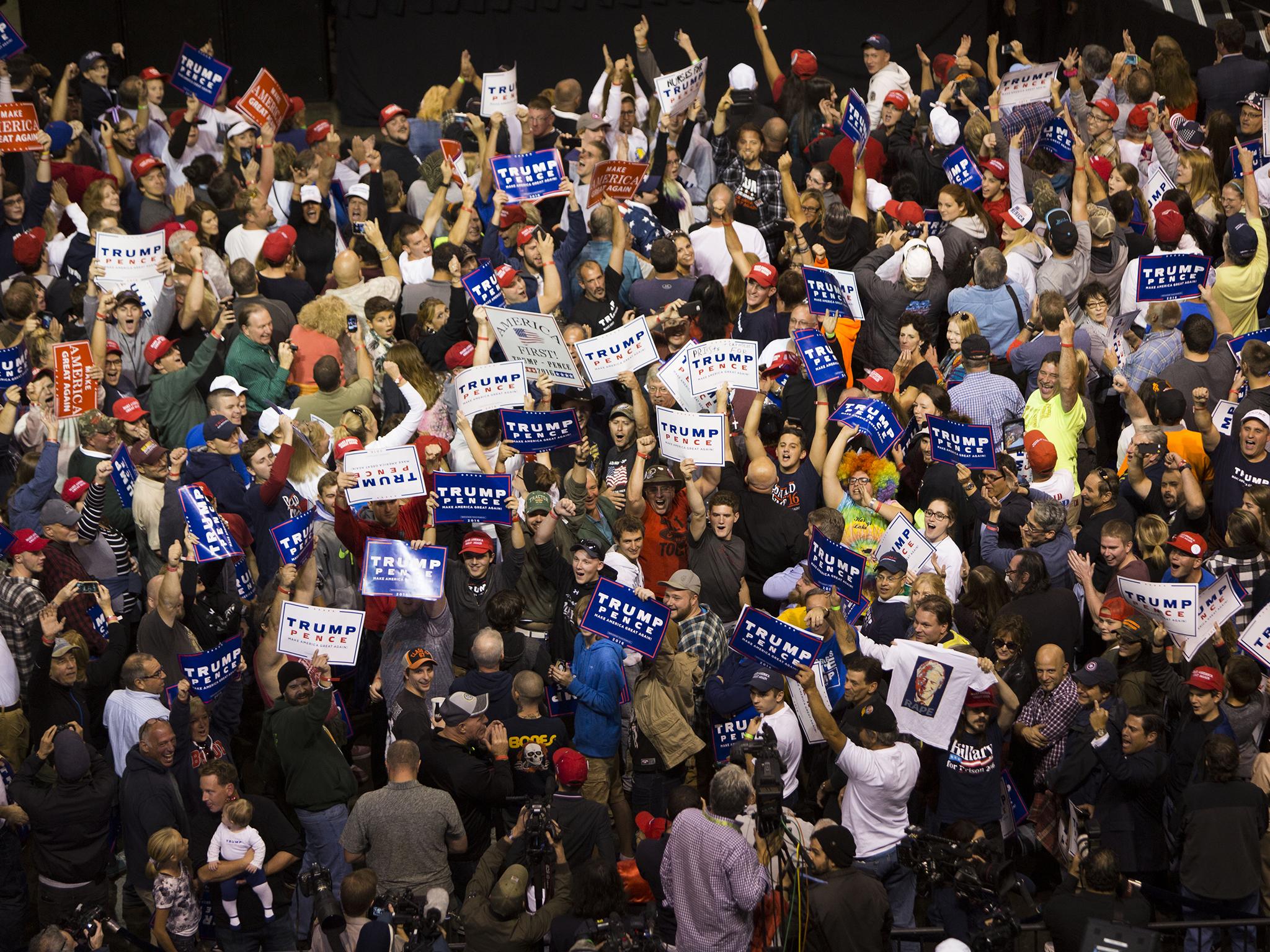I spoke to the former Democrat voters who made Donald Trump president, and this is what they actually want
Inside the Pennsylvanian county that lost Hillary Clinton the election, it's impossible to separate economic decline from fears about immigration – but when the President-elect fails to 'Make America Great Again', there will be new hope for the Democrats

You don’t often get the bus to Luzerne County, Pennsylvania looking for history. Until this election. Luzerne is one of the counties that lost Hillary Clinton the presidency, chucking its support from Barack Obama in 2012 to Donald Trump in 2016. Pennsylvania is now Republican red for the first time since Bill Clinton won the state in 1992.
Trump stormed over Hillary in Luzerne, turning Obama’s 6,000 Democrat lead, into a Republican one 26,000 strong. So who are the swing voters who gave Trump the Rust Belt, and why did they switch?
You don’t have to spend very long in the small towns of Wilkes-Barre and Hazelton, for voters to tell you: they want “change”. They want to kick a system they think is corrupt. They want to spit in the faces of Washington think-tankers and career senators who they believe offer them nothing.
They want a politician to radically change their towns and lives. That is why they voted for Obama, and that is why they voted for Trump. They voted for one anti-establishment candidate with a promise. And now another.
Change is the oldest longing here; life has never been bright. These are Pennsylvania’s old coal patch towns, dotted with beached Romanian and Russian Orthodox Churches, thrown up in a 19th century mass immigration to dangerous, deadly mines, often straight from Ellis Island. Deindustrialisation is nothing new here. Actual miners are long since dead, many of the pits were shut in the 1950s.
Is life really that bad in Luzerne? Unemployment fell under Obama and is now below 7 per cent. Yet these new jobs – caring, driving, stacking shelves – are not those that make you feel secure. Steady wages are scarce. The county has a worried Uberised precariat, not an assertive unionised proletariat. That is why they have chosen the change candidate since Bill Clinton. Typically, that was a Democrat. In 2016, that choice was no longer on the menu.
In Pennsylvania, for this group of voters, Hillary Clinton was just about the worst candidate the Democrats could have put up against Trump. They hate the establishment; she incarnated the establishment. In 1992 they chose Bill Clinton; by 2016, the Clintons were the ancient regime. Obama was change in 2008; by 2016 he was all disappointment.
Hope, change and broken promises have discredited Washington in Luzerne. People feel conned by politicians. They want them kicked down.
The failure of the old politics is very real. Drug abuse is soaring, as is child poverty – almost one in four under-18s is growing up in poverty. Across America, as in Luzerne Country, white life expectancy is falling and working class white voters have become the most pessimistic group. White America’s prescription drug epidemic is out of control. Incarceration rates for white women are soaring; white youths are more likely than their peers from other groups to die from drug overdoses; white divorce rates have rocketed. This is a crisis – and it has produced a panicked, restless electorate.
Trump took to these towns like a rock star. Politicians rarely draw crowds round these parts. It is estimated Ted Cruz attracted 300 people and Bernie Sanders just 1,500. Only Donald Trump packed an arena twice in Wilkes-Barre with 11,000 people, with another 1,000 turned away at the door. He drew 5,000 to see him in Scranton. Hillary Clinton didn’t come to the county to campaign. She sent her daughter Chelsea to attend a fundraiser.
The longer I spent in Luzerne County, the more I heard of Donald Trump’s voice. The President-elect is in these people’s heads far more than they may realise. “Crooked Hillary”, “drain the swamp” – with the agility of a lover, Trump has got himself inside their heads. How?
Trump is a billionaire, but one with an unusual education. The son of Fred Trump, a suburban New York real estate tycoon, he was sent to military school at the age of 13. Fred Trump’s bullying education to speak like the common man is The Donald’s secret. Trump speaks just like a construction worker – and like the people of Luzerne County. The people I met were sold. Trump has promised them the sun and moon.
“We are going bring things back,” said Trump in Wilkes-Barre. “We are going to bring them back like they have never been before. We are going to bring our jobs back. We are going to take our jobs back. We are bringing out manufacturing back.”
When voters in Luzerne County say they want to change the system they also mean the system that is giving them mass immigration. Beltway operatives are trying to work out the extent to which Trump swing voters were energised by ethnic versus economic anxiety, but nobody in Luzerne County separates the two. Uncontrolled mass immigration they see as a core part of their economic insecurity.
Trump, at his rallies in Wilkes-Barre, whipped his 11,000 crowds into a chant. The billionaire boomed: “What are we going to build?” The crowd bellowed back: “Build that wall.” He spoke to Wilkes-Barre’s deepest fear of losing its way of life. Trump would not be Trump if he hadn’t weaponised the white man’s deepest fear, of becoming a minority.
Driving into Hazelton, it is clear what voters, 79 per cent white in nearby Wilkes-Barre, fear. Hazelton is tense and segregated. Whites fear that immigrants – many from Dominica – are taking the little they have, while many incomers I approached for a few questions spoke no English. Most hoardings on the main street are now written in Spanish.
Between 2000 and 2010, the Hispanic population of Luzerne Country rose by 479 per cent, the biggest in America. This is part of a wave of Hispanic migration to the Rust Belt that has shaken towns historically almost exclusively white, tight-knit. Locals suggest they voted for Obama before the full wave of immigration was felt.
In recent years, residents have also been whipped up by a mini-Trump. Local firebrand Lou Barletta was mayor of Hazelton from 1999 to 2010, turning viciously anti-immigration in his final two years in office, before catapulting himself to Washington DC as a Pennsylvania congressman, where he was one of the first to endorse Trump and is now sitting in Trump’s transition team. If the media had spent more time out in towns like Hazelton, taking their temperature, they might have seen Trump coming.
It might have prompted them to ask another question: does anti-immigration feeling like this doom the Democrats to lose in places like Pennsylvania? Could Bernie Sanders have pulled off the presidency here? “Feel the Bern” would have surely been much more competitive, but Trump’s tongue would have buried the 75-year-old Brooklyn socialist under a slogan as pointed as “Crooked Hillary”.
What about in 2020? The outsider is a trick Trump can only pull once. He has promised great change just like Bill Clinton and Barack Obama. Should he not deliver, the cycle will begin again. The moment will soon come when the voters of Luzerne County could be persuaded to see “Make America Great Again” as one big con.
And what about race? People want to stop ethnic change, yes, but they also want to get on with their neighbours. The desire for social and political change, something to really improve the daily lives of these Pennsylvanians, feels much stronger than their longing to roll back to white America. The big problem facing the Democrats is how to offer these people the genuine change they crave.



Join our commenting forum
Join thought-provoking conversations, follow other Independent readers and see their replies